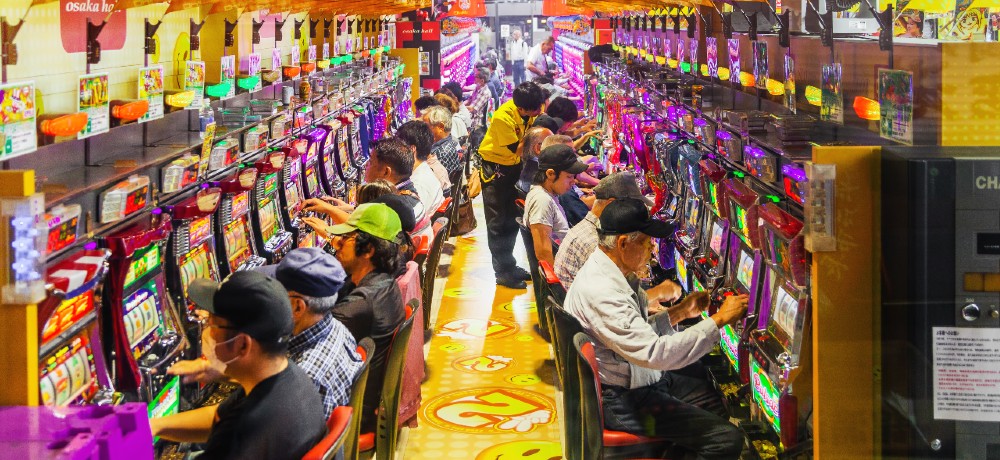Pachinko Vs Slot Machine: What's the Difference?
June 2021
While online casinos are officially banned in Japan and slot machines are called illegal, the game Pachinko is still incredibly popular and also legal to play. To many online casino operators that is odd since this game could also be qualified as gambling, but the authorities look at it differently. What exactly is this game and what's the difference between Pachinko and the worldwide popular slot machines?

At a glance, a pachinko or pachislot parlor could easily be mistaken for a slot machine arcade.
Pachinko's influence on the gaming market is similar to that of slot machines in many other countries. People gather around the machines and play to win and, like slot machines, Pachinko has been popular for many years. The game was introduced in 1920 and became vastly popular all across Japan. Pachinko's rules are similar to those of pinball: everything revolves around the balls that you as the player shoot into the machine. Your profit depends on the place where the balls land.
Pachinko can be found in bars, restaurants, or arcades, just as slot machines can be found in these places in other countries. Most online casinos have some kind of no deposit bonus for slot machines, but for Pachinko this is not the case, while this game is legal in Japan. What are other big differences between Pachinko and slot machines?
Balls VS rows and lines
Slot machines are all about the winning rows. When you press the button, the rolls start to spin and you hope to create a winning combination in a row. This isn't the case with Pachinko. Pachinko is about the balls and landing them in the right holes. No fruit symbols or Wilds &emdash; aiming is the most important factor of Pachinko.
No cash profits vs money
This might be one of the most important factors why Pachinko is legal and slot machines aren't. In contrast to slot machines, you cannot win great money with Pachinko. What you can win are points or tokens to play more or on a specific machine. The Pachinko machine is focused on entertainment rather than earning money although many people do spend a lot of money on keeping entertained.
Skills vs low threshold
While you don't need actual expertise or experience to play most slot machines, Pachinko does require some skills. It takes some good aiming technique and knowledge about how and where you need to aim to win prizes. Most beginners of slot machines get an online casino bonus without making a deposit and just start spinning the rolls of a slot machine, but Pachinko requires some expertise, and to gain this, you need some experience and knowledge about the game.
Tactics vs luck
Although many players of slot machines experience that their tactic works (or not), the slot machine is based on luck. You can focus on bonuses, but you can't really determine when the rolls stop rolling. With Pachinko this is different because you've got a serious role in getting the ball in a certain hole. Aiming the right way can lead to great wins!
A cultural tradition vs individual play
Pachinko is part of the Japanese culture and that plays an important role in the development of this game. While slot machines are mostly played in iDeal casinos, Pachinko is often played in the company of friends, family, or total strangers. It's not uncommon to see a group of people gathering around a Pachinko machine while only one person is playing.
An important aspect is, though, that many players don't talk while playing Pachinko. They support and watch each other's game, but it's not recommended to start a conversation or give extensive advice when someone is playing. It's a social game without being very social.
Legal vs illegal
So, why is Pachinko legal while playing slot machines isn't? According to the Japanese authorities, Pachinko is part of the history, tradition, and culture of Japan, and therefore, this game isn't forbidden. Another crucial thing is the fact that you can't win actual money directly: you win points. Therefore, Pachinko is allowed everywhere in the country while slot machines remain banned.
Related content
